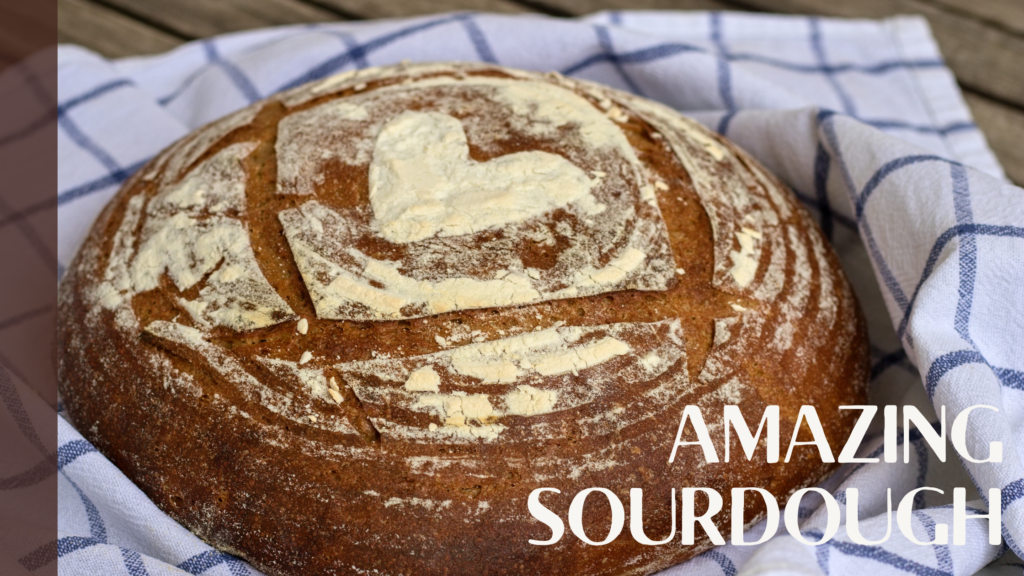
Let’s talk about bread, specifically sourdough.
Have you been encouraged to stop eating carbohydrates? Do you think it will help you lose weight? Or worse, are you convinced that carbohydrates, especially grains, are bad for you? It is a shame that such misinformation circulates and so many people are confused about this important food group. It just shows that we need to apply some common sense before we remove foods groups from our diet.
But what if you have a digestion issue with grains, does that mean for sure, you should avoid them? No. Before you remove anything, try sourdough.
What is sourdough?
Sourdough is a traditional method of fermenting grains to make bread. It has many benefits and is much more digestible.
Fermenting grains creates prebiotic substances from the starches in the flour to aid gut health so sourdough is a great food for feeding the good bacteria. This is sourdough made with white flour as that is what they do the research with. The fermentation process also makes nutrients more available, as it does with all fermented foods. However, the process of sourdough also adds B-vitamins that were not there before the fermentation occurred.
This makes sense since sourdough is a combination of good bacteria and yeast. In fact, 100 times more good bacteria than yeast as it happens. But wild yeast strains are definitely present since this is what makes the bread rise to give it an amazing, light-texture. And yeast is a great source of B-vitamins.
Sourdough for celiacs?
The acid nature, the “sour” of sourdough, aids in pre-digestion of the protein molecules in the grain especially the gliadin in gluten. This is because protease enzymes prefer an acid pH for optimal function. As a matter of fact, researchers are studying sourdough for consumption by celiacs.
The gluten must be completely degraded in order for a celiac to tolerate it, and this would make it quite sour tasting. Some experiments have involved using fully-degraded sourdough mixed with fresh gluten-free grains added after fermentation to lessen the sour taste. These breads were also suitable for celiacs.
What about the effects on blood sugar and insulin levels?
Probably the most amazing research comes from the University of Guelph. Researchers took four samples of bread: regular white flour bread, whole wheat bread, whole wheat with barley bread and white flour sourdough bread. The participants in this study were all between the ages of 50 to 60 and were all overweight. They were fed the breads at breakfast and then again at lunch.
After both meals, blood sugar and insulin levels were measured. The sourdough provided the lowest levels of blood sugar and insulin, and surprisingly, continued to keep the blood sugar and insulin levels low for the following meal where no bread was consumed. The whole wheat, on the other hand, provided the highest level of blood sugar after a meal, even higher than the regular white flour bread.
Make sure you are getting traditional sourdough
If you want to try sourdough, look for bakers in your area who are making traditional sourdough bread. This is a delicious adventure for you take. I am fortunate to have a baker at my local farmer’s market who make a few delicious varieties of sourdough bread!
A quick google search of “sourdough” and the name of the city or town where you live could make it easier to find someone local. If you cannot find a source in your area, you can order it online and have it shipped to you.
When you do find a source, cut yourself a slice, drizzle it with some virgin olive oil or cultured butter. Enjoy!
References
- Sourdough and cereal fermentation in a nutritional perspective, Kaisa Poutanen a,b,*, Laura Flander a, Kati Katina a, Food Microbiology 26 (2009) 693–699
- Structural changes of gliadins during sourdough fermentation Gokcen Komen, Ayse Handan Baysal, Sebnem Harsa, Izmir Institute of Technology, Izmir, Turkey
- Glycosidases and B group vitamins produced by six yeast strains from the digestive tract of Phoracantha semipunctata larvae and their role in the insect development, C. Chararas et al, Mycopathologia 1983, Volume 83, Issue 1, pp 9-15
- Sourdough Bread Made from Wheat and Nontoxic Flours and Started with Selected Lactobacilli Is Tolerated in Celiac Sprue Patients, Raffaella Di Cagno1,†, et al, Appl. Environ. Microbiol. February 2004 vol. 70 no. 2 1088-1096
- www.uoguelph.ca/news/2008/07/sourdough_bread
Leave a Reply